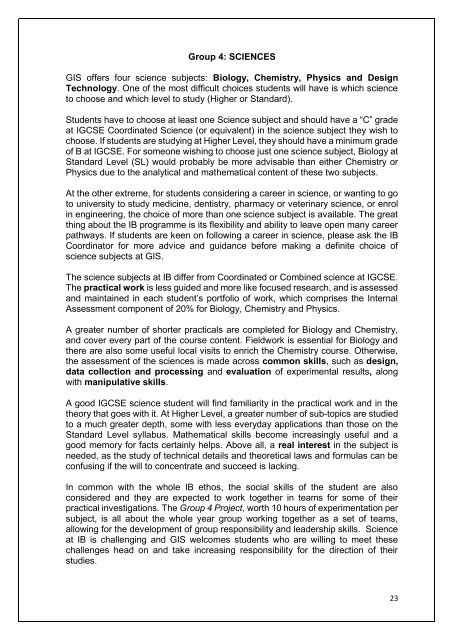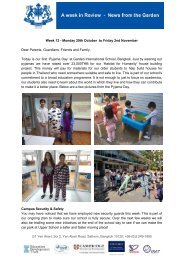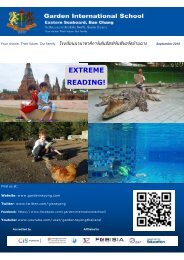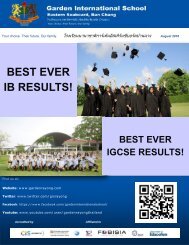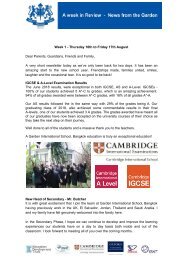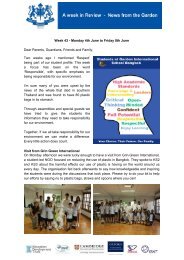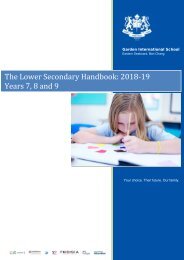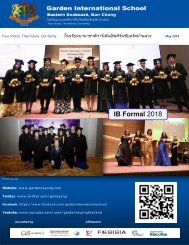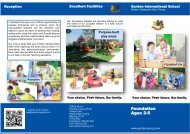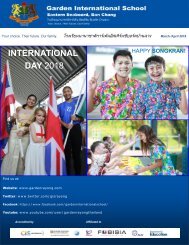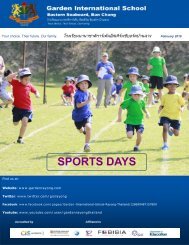GIS IB Handbook 2018-19
You also want an ePaper? Increase the reach of your titles
YUMPU automatically turns print PDFs into web optimized ePapers that Google loves.
Group 4: SCIENCES<br />
<strong>GIS</strong> offers four science subjects: Biology, Chemistry, Physics and Design<br />
Technology. One of the most difficult choices students will have is which science<br />
to choose and which level to study (Higher or Standard).<br />
Students have to choose at least one Science subject and should have a “C” grade<br />
at IGCSE Coordinated Science (or equivalent) in the science subject they wish to<br />
choose. If students are studying at Higher Level, they should have a minimum grade<br />
of B at IGCSE. For someone wishing to choose just one science subject, Biology at<br />
Standard Level (SL) would probably be more advisable than either Chemistry or<br />
Physics due to the analytical and mathematical content of these two subjects.<br />
At the other extreme, for students considering a career in science, or wanting to go<br />
to university to study medicine, dentistry, pharmacy or veterinary science, or enrol<br />
in engineering, the choice of more than one science subject is available. The great<br />
thing about the <strong>IB</strong> programme is its flexibility and ability to leave open many career<br />
pathways. If students are keen on following a career in science, please ask the <strong>IB</strong><br />
Coordinator for more advice and guidance before making a definite choice of<br />
science subjects at <strong>GIS</strong>.<br />
The science subjects at <strong>IB</strong> differ from Coordinated or Combined science at IGCSE.<br />
The practical work is less guided and more like focused research, and is assessed<br />
and maintained in each student’s portfolio of work, which comprises the Internal<br />
Assessment component of 20% for Biology, Chemistry and Physics.<br />
A greater number of shorter practicals are completed for Biology and Chemistry,<br />
and cover every part of the course content. Fieldwork is essential for Biology and<br />
there are also some useful local visits to enrich the Chemistry course. Otherwise,<br />
the assessment of the sciences is made across common skills, such as design,<br />
data collection and processing and evaluation of experimental results, along<br />
with manipulative skills.<br />
A good IGCSE science student will find familiarity in the practical work and in the<br />
theory that goes with it. At Higher Level, a greater number of sub-topics are studied<br />
to a much greater depth, some with less everyday applications than those on the<br />
Standard Level syllabus. Mathematical skills become increasingly useful and a<br />
good memory for facts certainly helps. Above all, a real interest in the subject is<br />
needed, as the study of technical details and theoretical laws and formulas can be<br />
confusing if the will to concentrate and succeed is lacking.<br />
In common with the whole <strong>IB</strong> ethos, the social skills of the student are also<br />
considered and they are expected to work together in teams for some of their<br />
practical investigations. The Group 4 Project, worth 10 hours of experimentation per<br />
subject, is all about the whole year group working together as a set of teams,<br />
allowing for the development of group responsibility and leadership skills. Science<br />
at <strong>IB</strong> is challenging and <strong>GIS</strong> welcomes students who are willing to meet these<br />
challenges head on and take increasing responsibility for the direction of their<br />
studies.<br />
23


